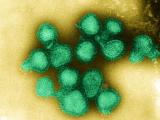Oct 24, 2011 (CIDRAP News) – The US Food and Drug Administration (FDA) recently advised health providers not to use needle-free injector devices to administer influenza vaccines, because so far no flu vaccines have been approved for administration using such devices.
The FDA said it has recently received questions about the use of the jet injector devices to administer flu vaccines, according to an Oct 21 statement. So far only one vaccine—measles, mumps, and rubella (MMR) —has been approved for administration by jet injector.
It's unclear how many pharmacies and health departments are offering needle-free flu vaccines. Michael DeAngelis, a spokesman for CVS Pharmacy, the nation's second largest pharmacy chain, told CIDRAP News that CVS did not offer needle-free flu vaccination as an option this season.
However, other chains had announced plans to offer them. For example, Publix, a grocery store chain based in Lakeland, Fla., announced on Sep 26 that 52 of its pharmacies will offer the needle-free option at the same cost as the traditional intramuscular flu shot.
Meanwhile, Fred Meyer Stores, which operates supermarkets in four western states, said in a Sep 7 press release that most of its stores would offer the needle-free option with injectors produced by Bioject Medical Technologies, Inc., based in Portland, Ore. Marc Cecchini, the company's vice president and pharmacy director, said in the statement, "While needle-free vaccines have been used in the past in some public agencies and the military, this is the first time this option has been available to the public through their pharmacies."
Following the FDA's announcement, Kroger announced that it would immediately discontinue using the needle-free devices at all its pharmacies and The Little Clinic locations, according to an Oct 21 press release. The company said it is seeking guidance from the Centers for Disease Control and Prevention (CDC) and the FDA regarding revaccination.
Aside from the MMR vaccine, the FDA said it has no data to support the safety and effectiveness of other vaccines delivered by jet injector. It said FDA approval of vaccines is based on a host of factors, including method and route of administration. "Changes in the dose, route, and/or method of administration have the potential to impact immunogenicity, and the safety and/or efficacy of a vaccine," it said in the statement.
Jet injectors, as a different delivery method, have the potential to change the characteristics of an approved vaccine, and vaccine preparations administered with them must be individually evaluated for safety and effectiveness and submitted to the FDA for review and approval.
The FDA recommended that all approved vaccines be administered according to their labeling and that health providers carefully review dosing and administration labeling, as well as injector device labeling, before any immunization.
Tom Skinner, spokesman for CDC, said the agency isn't aware of any safety issues related to use of the jet injectors for flu vaccines and that its experts are looking into whether people who have received needle-free flu vaccines need to be revaccinated. "We hope to answer that question imminently," he said.
PharmaJet, based in Golden, Colo., said in an Oct 21 statement that it received no notice from the FDA about any jet injector concerns. "To our knowledge, no other needle-free injection manufacturer received notice or an opportunity to discuss this matter with the FDA," the company said.
Earlier the same day PharmaJet announced that it had received FDA marketing clearance for two of its devices. According to the company, indications for both devices say healthcare providers who routinely administer injections can use the systems for both adults and children. It said it had contacted the FDA and planned to continue discussions today.
Ralph Makar, Bioject's president and chief executive officer, said in a statement today that the FDA's statement was surprising, given that two of its jet-injection devices have been cleared for indications that include delivery of subcutaneous or intramuscular injections of vaccines and other injectable drugs.
"We are looking into the matter to better understand the situation and the FDA's concerns. A number of Bioject's needle-free injection devices have been on the market for many years, and we are committed to resolving this matter with the FDA in a timely manner."
Earlier this month, researchers published the first human trial of seasonal flu vaccine administered by a newly approved needle-free jet injector system developed by D'Antonio Consultants International, with support from the CDC. The study, published in the Oct 8 issue of Vaccine, found that immunization was safe, with an immune response that resembled the conventional needle-and-syringe method.
See also:
Oct 21 FDA press release
Sep 26 Publix press release
Oct 21 Kroger press release
Oct 24 Bioject press release
Oct 10 CIDRAP News Scan on Vaccine study




















